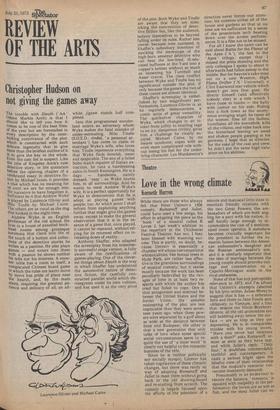REVIEW
OF THE ARTS
Christopher Hudson on not giving the games away
The trouble with Sleuth C AA' Odeon Marble Arch) is that I should like to tell you how it comes to be one of the best films of the year but am forestalled in every description by the interlocking contrivance of the plot which is constructed with such delicate ingenuity that to give More than the briefest outline of it is to give the key to the whole. Even the cast list is suspect. Like the title of Kingsley Amiss new detective story, or the quotation before the opening chapter of a celebrated essay in detective fiction by Michael Innes, it provides a clue which has no meaning for US until we are far enough into the narrative to have forgotten it. Sufficient be it that Andrew Wyke' is played by Laurence Olivier and Milo Tindle by Michael Caine. The others are as vocal as the dog that barked in the night-time.
Andrew Wyke is an English gentleman of the old school. He lives in a house of panelled booklined rooms among grotesque automata that clank into life at the touch of a button and collections of the detective stories he writes as a pastime. He also plays games — and enters into them With a passion he shows neither his wife nor his mistress. A snooker table has a room to itself, a Complicated Chinese board game m which the rules are learnt move by move has pride of place near the hearth, and, by the main stairs, requiring the greatest patience and delicacy of all, an all white jigsaw stands half completed.
Into this programmed wonderland enters an adversary whom Wyke makes the fatal mistake of under-estimating. Milo Tindle (S.O.E.D.: tindal, a personal attendant ') has come to claim in marriage Wyke's wife, who loves
Tindle represents everything that Wyke finds boorish, mean and despicable. The son of a failed Soho watch repairer of Italian extraction, he runs a hairdressing salon in South Kensington. He is a dago — handsome, nattily dressed, ' easy ', as Wyke taunts him, in all surroundings. And he wants to steal Andrew Wyke's wife. It is a perfect opportunity for Wyke to demonstrate that he is adept at playing games with people, too. At which point I shall refrain from explaining anything further that might give the games away, except to make the general observation that it is in the essence of a game that, once played, it cannot be repeated, without relying for its renewed effect on increasing doses of reality.
Anthony Shaffer, who adapted the screenplay from his immensely successful stage version, is fully aware of the ramifications of games-playing. One of the cleverest things about Sleuth is the way in which Shaffer has understood the automotive nature of detective fiction, the carefully constructed parallel world which disintegrates under its own volition, and has used it as the very pivot
of the plot. Both Wyke and Tindle are aware that they are mimicking the conventions of detective fiction but, like the audience, believe themselves to be beyond falling under its rules. Rather less clever, because now outdated, is Shaffer's subsidiary intention of mocking the stereotype of the high-born amateur detective who can beat the low-bred, ill-educated buffoons at the Yard into a copper's helmet without so much as loosening his Turnbull and Asser cravat. The class conflict between Wyke and Tindle has no significance outside the plot, if only because the games the two of them create are almost identical.
Shaffer's screenplay is embellished by two magnificent per' formances. Laurence Olivier is, as he regularly demonstrates, a comic actor of great versatility. The quicksilver character of Wyke, which changes in an in. stant from jollity to snarling rage to an icy, dangerous civility, gives him a challenge he clearly enjoyed. Michael Caine, by no means outshone, copes with an even more complicated role without losing his feel for the underlying character. Leo Man kiewicz's direction never forces our attention; his cameras utilise all of the house and gardens so that at no time are we suffocated by a sense of the proscenium arch bearing down over the screen performances. It is a film not to be missed.
For all I know the same can be said about Battle for the Planet of the Apes (' A '), the last in the ' Apes ' trilogy, except that I missed the press showing and the only colleague I spoke to about it afterwards had fallen asleep in the middle. But for heaven's sake miss out on a new Western, High Plains Drifter (' X ' Universal), a Clint Eastwood star vehicle which doesn't get into first gear. He directs himself (and effectively nobody else) in a role which I have come to loathe — the bully with justice on his side. Riding into a hick town as the anonymous avenging angel, he rapes all the women, fires all the bullets, humiliates all the townsfolk, kills all the villains, and rides back into the hinterland leaving an awed and shaken people gasping at his prowess. I hope that as director, for the sake of the cast and crew, he didn't put the same high valuation on his abilities.






























 Previous page
Previous page